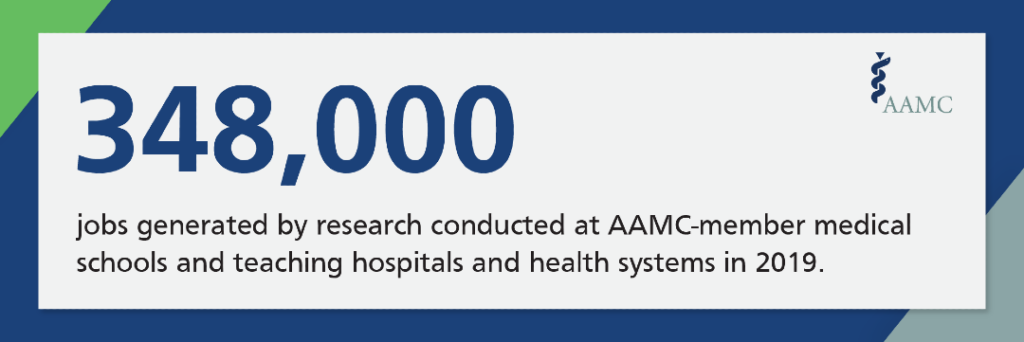AAMC Action advocates across the country are taking action to urge Congress to pass a fiscal year (FY) 2024 spending package that includes strong funding for federal programs that support the academic medicine community and the patients we serve. These programs include the National Institutes of Health (NIH) and Health Resources and Services Administration (HRSA) workforce programs, which are critical to academic medicine’s efforts to improve the health of people everywhere.
The NIH funds breakthrough medical research that helps Americans live healthier, longer lives. Federal investment in this research, predominantly taking place at medical schools and teaching hospitals, is key to developing the treatments, diagnostics, cures, and preventive strategies that improve the health of patients, families, and communities nationwide.
AAMC Action advocates are pushing for Congress to provide no less than the $47.7 billion approved by the Senate Appropriations Committee for the NIH to support research nationwide and continue making progress against existing and emerging threats to our nation’s health, security, and global competitiveness.
Robust funding for NIH research is critical, but what would a budget shortfall jeopardize?
Scientific Growth and Cures and Treatments Depend on Robust Funding from Congress
Growth in the NIH’s budget ensures our nation makes smart investments in research, enhancing our competitiveness around the world, and supporting high-quality research jobs in every state. It is more critical than ever that this agency can continue to efficiently support the health of Americans everywhere, and their regional and local economies. In 2019 alone, research conducted at AAMC-member medical schools and teaching hospitals and health systems generated $33 billion in gross domestic product (GDP) and 348,000 jobs.

Congress has doubled the NIH’s budget before – between 1998 and 2002 – and that increased budget had widespread positive impacts across health care, expanding the research workforce and advancing research discoveries that saved and improved countless lives. The academic medicine community played a significant role in these discoveries because medical schools and teaching health systems and hospitals perform approximately 60% of NIH-funded extramural research.
The research NIH funds today leads to improved health tomorrow, including:
- Almost 3.8 million lives saved by cancer research since 1991.
- A 56% decrease in the rate of heart attack deaths per 100,000 people between 1999 and 2020.
- All 356 new FDA-approved drugs from 2010 to 2019.
- 488 clinical trials on Alzheimer’s disease and related dementias.
- Cutting-edge and life-saving innovations in care and treatment, including cell-based gene therapies for treatment of sickle cell disease, immunotherapies for lung cancer and leukemia, ways to determine the effectiveness of chemotherapy on breast cancer, and advancements in cochlear implants and liver transplants.
- A 90% decrease in the number of children perinatally infected with HIV.
Where Do We Go From Here?
Congress must provide consistent, robust funding to the NIH budget which will lead to continuous development of innovative cures and treatments for patients, families, and all communities nationwide. And we need strong advocates like those in the AAMC Action community to unite in ensuring congressional support for the nation’s medical research enterprise.
Sustained, meaningful growth in the NIH budget, and the research at medical schools and teaching health systems and hospitals that it funds, is an investment that results in saved lives, better health, economic growth, stronger local and regional economies, and U.S. global leadership in science and technology. NIH funding also enhances the medical research workforce, helping to nurture the next generation of physician scientists needed to discover cutting-edge treatments and cures.
AAMC Action urges Congress to swiftly pass appropriations legislation that continues the robust support for NIH-supported research that leads to longer, healthier lives for patients and communities nationwide.
